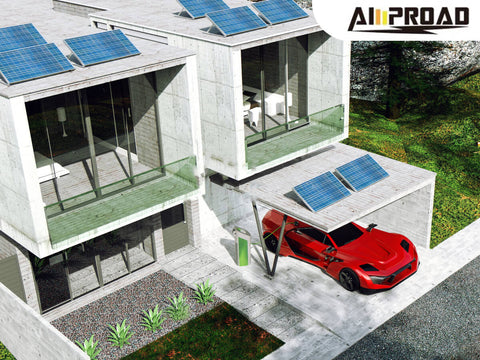
Installing an EV charging station starts with choosing a convenient location near the vehicle and an electrical panel. Selecting Level 1 or Level 2 charging depends on speed needs. A certified electrician should handle installation and permits for safety. Setting up authentication methods like RFID cards or mobile apps enhances security, ensuring a smooth and efficient charging experience.
How to Install Electric Vehicle Charging Station?
Creating a successful Electric Vehicle (EV) charging station involves a comprehensive approach that considers various factors. From the initial planning stages to ongoing maintenance and community integration, each step plays a crucial role in ensuring a seamless and sustainable charging experience.
Choosing a Suitable Location:
Identifying an accessible spot for the electric vehicle charging station is the foundation of the entire setup. The location should be convenient for EV owners, ensuring proximity to their vehicles for ease of use. A well-thought-out location encourages regular use and contributes to the overall success of the charging station.
Power Supply Considerations:
Locating the charging station near an electrical panel is essential for a reliable power source. Assessing the electrical capacity is equally crucial to ensure it can support the charging station without overloading the system. Adequate power supply is fundamental for delivering efficient and timely charging services to EV users.
Selecting Charger Type:
Choosing between Level 1 and Level 2 chargers is a decision that impacts charging speed and convenience. Level 1 chargers are suitable for overnight charging, while Level 2 charger, including the level 2 portable EVSE, offers faster results. Aligning the EV charger near me type with the needs and preferences of users contributes to a positive charging experience.
Certified Electrician Involvement:
The installation process should involve a certified electrician. Their expertise ensures compliance with safety standards and the acquisition of necessary permits. This step is critical in guaranteeing the overall safety and effectiveness of the charging station.
Authentication Setup:
Establishing authentication methods, such as RFID cards or mobile apps, enhances security and control over the charging station's usage. This not only prevents unauthorized access but also allows for accurate tracking of energy consumption and billing.

Ensuring Safety and Compliance:
Following installation guidelines is paramount to guarantee the safety of the charging station. Adhering to local regulations and obtaining any required permits ensures compliance with legal requirements and standards.
Testing and Verification:
Thorough testing post-installation is essential to verify that the charging station operates efficiently and safely. This step helps identify and address any potential issues before they impact users.
Educating Users:
Providing clear instructions for users on how to properly use the charging station promotes responsible and effective charging practices. User education is a key component in creating a positive and user-friendly charging environment.
Maintenance and Monitoring:
Implementing a regular maintenance schedule is crucial for the long-term performance of the charging station. Continuous monitoring of the station's functionality allows for prompt identification and resolution of any issues that may arise.
Scaling Up for Future Needs:
Considering scalability is essential for accommodating potential increases in charging demand. Ensuring that the EVCS setup can evolve with changing requirements helps future-proof the infrastructure.
Environmental Considerations:
Exploring environmentally friendly installation practices and optimizing the station's energy efficiency contribute to sustainability. This aligns with the broader goals of reducing environmental impact and promoting green energy solutions.
Promoting Accessibility:
Strategically placing the charging station to enhance accessibility for diverse users is a community-centric approach. Encouraging community engagement and the adoption of electric vehicles fosters a positive attitude towards sustainable transportation.
User Education and Outreach:
Offering educational resources on EV charging to the community fosters awareness and understanding of the benefits of electric vehicles. Outreach initiatives contribute to building a supportive and informed user base.
Community Integration:
Integrating the EV charging station into community planning is a holistic approach to sustainable transportation. Fostering a positive attitude towards electric vehicles contributes to the overall success and acceptance of the charging station.
Monitoring and Adapting:
Implementing a system for ongoing monitoring and adjustments ensures the continued success of the charging station. Adapting the setup based on user feedback and evolving technology allows for continuous improvement and user satisfaction.
What Is An EV Charging Station?
An Electric Vehicle (EV) charging station is a dedicated infrastructure designed to supply electrical energy to recharge the batteries of electric vehicles. These stations play a pivotal role in supporting the widespread adoption of electric mobility by providing a convenient and accessible means to replenish an EV's battery.
EV charging stations come in various forms and levels, catering to different charging needs. Level 1 charging involves a standard household electrical outlet and is suitable for overnight charging, while Level 2 charging utilizes higher voltage and is commonly found in residential settings and public locations, offering faster charging times. Fast-charging stations, classified as Level 3 or DC (Direct Current) charging, provide rapid charging for EVs, making them ideal for long-distance travel.
Charging stations are equipped with essential components such as charging plugs, connectors, and communication interfaces that enable a seamless interaction between the EV and the charging infrastructure. Some stations incorporate additional features like user authentication systems, touchscreen interfaces, and payment mechanisms to enhance user experience and ensure secure access.
As the electric mobility ecosystem continues to evolve, the deployment of an extensive and interoperable charging infrastructure is crucial for overcoming range anxiety and facilitating the integration of electric vehicles into daily life. The strategic placement of charging stations in urban areas, along highways, and in commercial spaces contributes to the convenience and practicality of owning an electric vehicle, ultimately promoting a more sustainable and environmentally friendly mode of transportation.
Why Should You Install EV Charging Station?
Installing an Electric Vehicle (EV) charging station is a forward-thinking move with a range of benefits. Firstly, it contributes to the growing shift towards sustainable transportation. By providing a convenient and accessible means for EV owners to charge their vehicles, you actively support the reduction of carbon emissions and dependence on traditional fossil fuels.
For businesses, installing EV charger stations can attract a broader customer base. As the number of electric vehicles on the road continues to rise, offering charging facilities can be a powerful incentive for environmentally conscious customers. It enhances the overall customer experience, making your business more appealing and aligned with contemporary sustainability values.
Moreover, installing EV charging stations aligns with corporate social responsibility (CSR) initiatives. It demonstrates a commitment to environmental stewardship, portraying your business as environmentally responsible and attuned to the evolving needs of the market.
On a practical level, providing charging infrastructure contributes to the development of a more comprehensive and reliable EV charging network. This network, in turn, helps alleviate concerns about "range anxiety," making electric vehicles a more viable option for a broader audience. It supports the growth of the electric mobility ecosystem, fostering a cleaner and greener future.
For residential properties, installing a home EV charging station adds convenience to the daily lives of EV owners. EV home charger allows for overnight replenishment of the vehicle's battery, ensuring it's ready to go each morning. This convenience can be a deciding factor for individuals considering the switch to electric vehicles.
In essence, installing EV charging stations near me is a proactive step towards a sustainable future. It benefits the environment, attracts eco-conscious customers, aligns with CSR goals, and contributes to the overall growth and acceptance of electric mobility. Whether for a business or a residence, embracing this technology is a positive investment in a cleaner, more sustainable transportation landscape.

How to Choose the Right EV Charger?
Selecting the right Electric Vehicle (EV) charger is a crucial decision that impacts the efficiency, convenience, and safety of your charging experience. With various options available, it's essential to consider factors that align with your needs and preferences.
Charging Speed: One of the primary considerations is the charging speed you require. Charging stations are categorized into Level 1 EV charger, Level 2 EV charger, and Level 3 charger, each offering different charging speeds. For home use, a Level 2 charger is often sufficient, providing faster charging times than a standard household outlet.
Compatibility: Ensure that the charger is compatible with your electric vehicle. Different EV manufacturers may have specific charging connectors, so it's crucial to select a charger that suits your vehicle's requirements.
Power Output: The power output of the charger influences charging speed. A higher power output typically results in faster charging. However, it's essential to consider your home's electrical capacity to avoid overloading the system.
Installation and Space: Consider the installation requirements and available space. Some chargers are designed for easy home installation, while others may need professional installation services. Amproad, a leading Level 2 EV charger manufacturer in North America, offers affordable home chargers that meet high safety standards. Their efficient and safe chargers provide a reliable home charging solution.
Smart Features: Many modern EV charger comes equipped with smart features. These include smartphone connectivity, scheduling options, and energy management capabilities. Smart chargers, like those offered by Amproad, can enhance your charging experience by providing flexibility and control over your charging sessions.
Cost: Evaluate the overall cost of the charger, including installation expenses. While some chargers may have a higher upfront cost, they could offer long-term savings through efficient energy management.
Brand Reputation: Consider the reputation of the charger manufacturer. Amproad, as a leading Level 2 EV charger manufacturer in North America, has established itself as a reliable and trusted provider. Their affordable home chargers have undergone rigorous testing to ensure safety and efficiency.
Warranty: Check the warranty offered with the charger. A longer warranty period often reflects the manufacturer's confidence in the product's durability and reliability.
By taking these factors into account, you can make an informed decision when choosing an EV charger. Amproad's commitment to safety, affordability, and efficiency makes them a reputable choice for your home charging solution. Their Level 2 charger, having passed high standard tests, not only meet but exceed expectations, ensuring a secure and efficient charging experience for your electric vehicle.
Related Articles:


